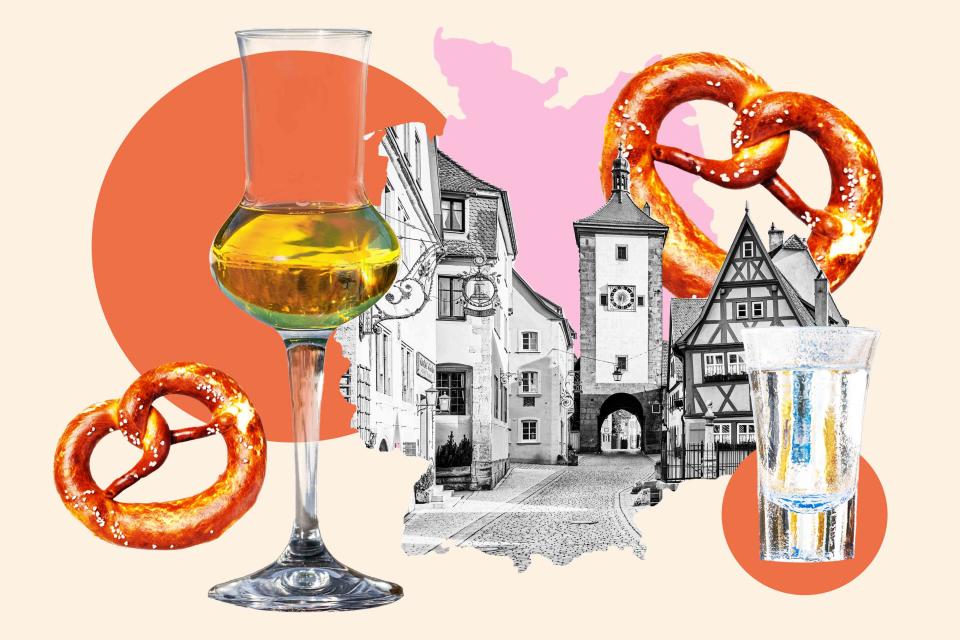Uncover Southern Germany's Hidden Schnapps Scene
Beer is not the only alcohol worth drinking in Bavaria.

Rolf Seiffe / Picture Press/Redux
Bavaria, the scenic home of countless breweries, beer gardens, and Munich’s iconic Oktoberfest, is synonymous with beer, but all those suds can drown out another local specialty: Schnapsbrennen. Unlike schnapps, the American loanword that calls to mind cloying flavor bombs of peppermint or cinnamon, this Schnapps is a broad term for German spirits, including the dry, refined fruit brandies and herbal liqueurs that proliferate in southern Germany.
Franziska Bischof, a fourth-generation distiller and 2018 German Female Distiller of the Year, says there are around 24,000 distilling licenses in Germany — even her tiny region of 2,200 inhabitants has 82 licenses. But many don’t bother to sell their products, and the vast majority, like Bischof, may only produce up to 300 liters per year, can only sell domestically, and must have an agricultural component like orchards. Maintaining distillers’ connection to the land makes sense to Bischof, who points out, “Every kind of alcohol derives from something agricultural.”
These days, even Germans are often unaware of the robust homegrown liquor culture under their noses. Peter Rohde, who runs a bespoke tour business out of Munich called Prime Tours Germany, says his primarily American and Indian customers certainly aren’t familiar with the Schnapps scene. Rohde recommends a crisp fruit brandy or bitter gentian spirit to aid digestion “after a fatty Bavarian meal of pork knuckle or goose” or to accompany cake — many of which, like the famous kirsch-flavored Black Forest Cake, are also made with Schnapps.
Related: 22 German Specialties From Pretzels to Schnitzel
You’ll find Schnapps served the traditional way — in a small glass for sipping neat — at plenty of bars and restaurants throughout Bavaria, and even in the occasional cocktail, but visit these small distilleries to find out more at the source amid various stunning landscapes.
Edelbrennerei Bischof
At the northern edge of Bavaria known as Franconia, Franziska Bischof carries on her family’s distilling tradition as “Die Brennerin,” or The Distiller. A brandy sommelier certified by the Genussakademie Bayern, Bischof opened the country’s first dedicated “Destillathek,” or distillery tasting room and shop, in 2017, inspired by winery Vinotheks. Before you order a cocktail at the elegant bar, let her guide you through a flight of classics showcasing fruit like Vogelbeere (rowanberry), with notes of marzipan, or expressive Cassis (black currant), perfect for introducing newcomers to the subtleties of high-quality brandy. Don’t miss the whiskey, either: Bischof’s father was a decade ahead of the nationwide trend when he started distilling Rhöner whiskey with wheat from his farm and aging it in locally made oak barrels in the 1990s, and some current expressions have been aged at least 10 years or finished in chestnut casks. For more, hike Der Brennerweg — Germany’s big on distillery trails, and this one features several routes through the woods and past biodiverse meadow orchards to four additional distilleries. Hauptstraße 8, 97797 Wartmannsroth, Germany, diebrennerin.de
Ferienhof Schwand
The southwest tip of Bavaria touches briefly on Lake Constance (Bodensee in German), a renowned destination whose shores also meander through Austria, Switzerland, and near Liechtenstein. Alexandra and Stefan Hanser make lovely spirits running the gamut from single-varietal apple and pear brandies and hazelnut liqueur to gin, whiskey, absinthe, and the winter favorite Eierlikör, an eggnog-like treat blended with house rum. The tasting hours here are quite limited — Mondays at 8 p.m., April through October at last check — so thankfully you can also settle into one of the charming vacation rentals on-site, spitting distance from the famous old town on the island of Lindau island and offering stunning views of the lake, the nearby Alps, and the fruit orchards that supply the distillery. Schwand 2 + 3, 88142 Wasserburg, Germany, ferienhof-schwand.de
Michels Kräuteralp Hörmoos
If a drinker in the U.S. knows gentian, it’s probably thanks to the French liqueur Suze, but producers in Germany’s mountainous Allgäu region treasure the bitter Alpine root, too. Michael Schneider, who operates the highest distillery in the area at a dizzying 4,265 feet, “is an absolute specialist in the field,” says Mathias Krönert, a consultant from the Bavarian State Institute for Viticulture and Horticulture. “It's incredibly beautiful up there on the Alps and worth the hike.” Saturday through Monday afternoon, May to November, you can visit and sample complex gentian spirits as well as outstanding Schnaps centering Meisterwurz (masterwort, sometimes called European ginseng for its purported curative properties), hearty Latschenkiefer (mountain pine), earthy mushrooms, and even juniper, which has a long history of local use and shines here in an herbaceous, unfiltered gin. 87534 Oberstaufen-Steibis, Germany, kraeuteralp.de
For more Food & Wine news, make sure to sign up for our newsletter!
Read the original article on Food & Wine.

